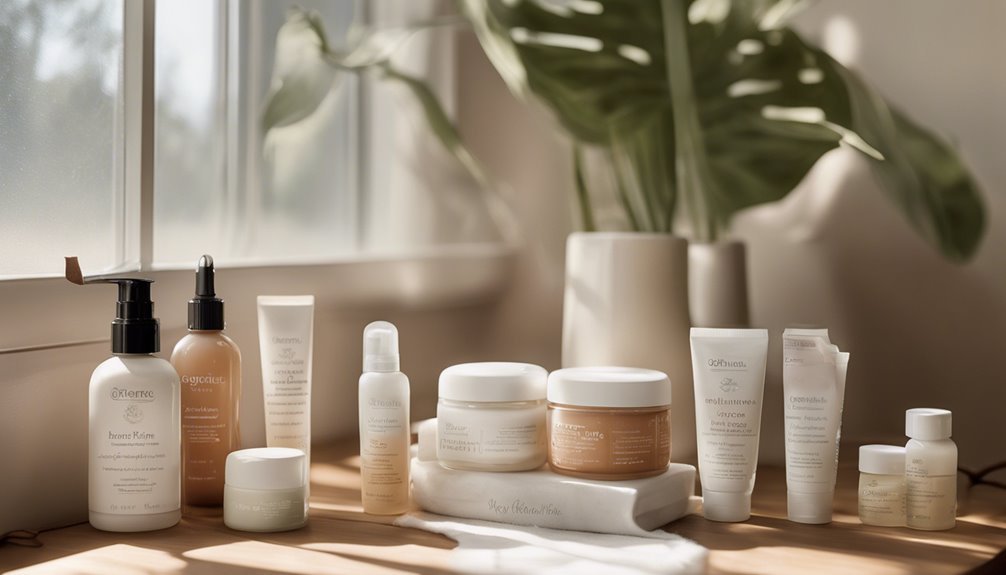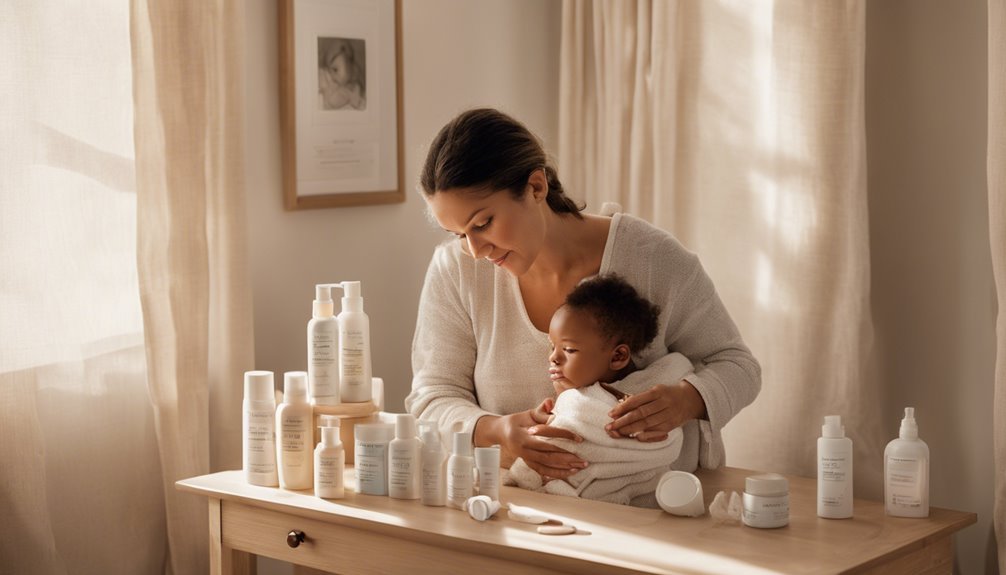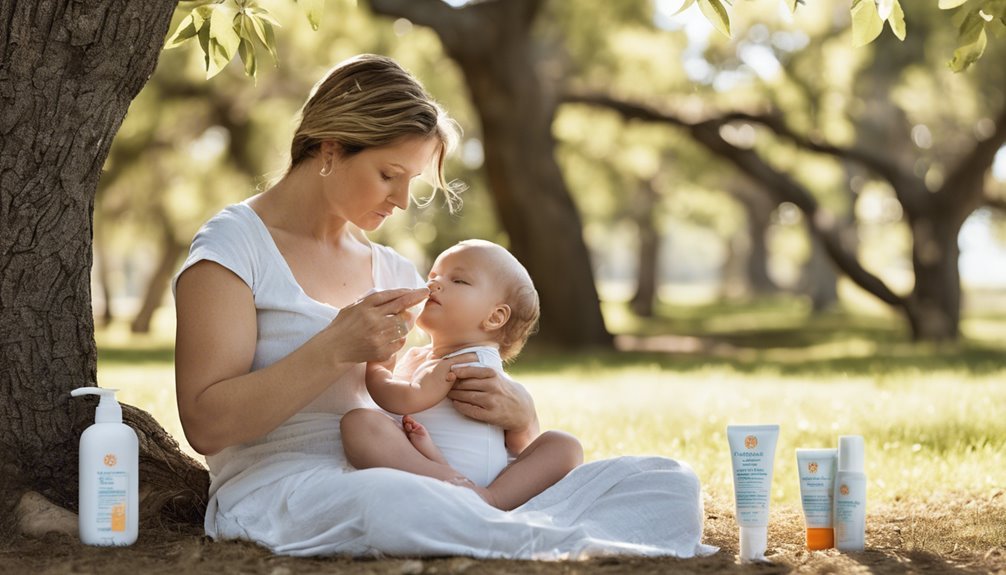Did you know that your skin absorbs up to 60% of the products you apply to it? As a nursing mom, this means the skincare ingredients you choose not only affect your skin's health but can also impact your baby. It's crucial to avoid certain chemicals that could harm your baby's development or cause allergic reactions. Now, you're likely wondering which ingredients are safe and which ones should be avoided at all costs. Let's explore the safest options for your skin care during this sensitive period, ensuring you and your baby stay healthy.
Key Takeaways
- Opt for products free from parabens, phthalates, and retinoids to avoid hormonal disruptions and potential health risks.
- Choose hypoallergenic and fragrance-free skincare to minimize allergic reactions and protect the baby's sensitive skin.
- Select moisturizers and sunscreens that contain safe ingredients like hyaluronic acid, glycerin, and zinc oxide.
- Read labels carefully to ensure products do not contain harmful chemicals and consult healthcare providers for recommendations.
- Use gentle exfoliation methods with natural exfoliants like oatmeal or finely ground almonds to maintain skin health.
Understanding Skin Absorption
When you apply a product to your skin, it's not just sitting on the surface; some of the ingredients may be absorbed into your bloodstream. Understanding how your skin barrier functions and the absorption rates of various substances is crucial, especially for nursing moms who are concerned about what they pass on to their babies.
Your skin, the largest organ of your body, acts as a protective barrier against environmental threats but isn't impermeable. Certain molecules can penetrate this barrier, depending on their size, solubility, and the health of the skin itself.
Small, lipid-soluble molecules tend to have higher absorption rates and can enter the bloodstream more readily than larger, water-soluble ones.
It's essential to consider the integrity of your skin barrier. Compromised skin, which can result from conditions like eczema or damage from harsh skincare products, may allow more substances to penetrate.
When choosing skincare products, look for those that support and maintain the health of your skin barrier, using ingredients that are safe and beneficial.
As a nursing mom, you're responsible not only for your own health but also for the wellbeing of your child. Being informed about what your skin absorbs helps you make safer choices for both of you.
Ingredients to Avoid
Many common ingredients found in skincare products can be harmful to both nursing mothers and their babies. When you're choosing products, it's crucial to be aware of certain hazardous chemicals that could pose risks. These substances can be absorbed through your skin and potentially affect your breast milk, leading to unwanted side effects in both you and your baby.
Here's a quick guide to some of the key ingredients you should steer clear of:
| Ingredient | Potential Side Effects |
|---|---|
| Parabens | Hormonal disruptions, potential links to breast cancer |
| Phthalates | Developmental issues, hormonal changes |
| Retinoids | Linked to birth defects when used in excess during pregnancy |
Avoiding these ingredients can significantly reduce the risk of exposing your baby to unwanted chemicals. Always read the labels and opt for products that are free from these harmful substances. If you're unsure, consult with a healthcare provider who understands the importance of safe skincare during this sensitive phase. Remember, your choice in skincare not only affects your health but also the well-being of your little one.
Safe Ingredients for Nursing Moms

While it's crucial to avoid certain harmful ingredients in skincare products, there are several safe and beneficial alternatives for nursing moms. You can confidently use products containing hyaluronic acid, which helps to hydrate and plump your skin without harming your baby.
Glycerin, a gentle and non-irritating moisturizer, is also safe and effective for maintaining skin hydration and barrier function.
Zinc oxide, commonly found in mineral sunscreens, provides excellent protection against UV rays and is considered safe for both you and your baby. It's an ideal choice for nursing moms seeking effective sun protection.
Additionally, vitamin C, a powerful antioxidant, supports skin health by promoting collagen production and can brighten your complexion. It's safe for use during nursing and can help combat signs of aging.
When considering nursing skincare, always prioritize ingredient safety. Opt for products specifically formulated for sensitive skin, as these are less likely to contain harsh chemicals.
Common Allergens and Irritants
Several common allergens and irritants can compromise skin health, particularly for nursing moms.
It's crucial you're aware of these substances to avoid potential allergic reactions and maintain your skin's integrity while caring for your newborn.
Here's what you need to watch out for:
- Fragrances: Often hidden under the term "perfume", fragrances are common irritants that can trigger allergic reactions, causing redness and itchiness.
- Preservatives: Substances like parabens and formaldehyde releasers are used to prolong shelf life but are notorious for causing skin irritation and allergic responses.
- Dyes and Colorants: Synthetic colors derived from coal tar or petroleum often lead to skin sensitivity. Look for labels that indicate the presence of these additives.
- Alcohol: Especially denatured alcohol, which can be excessively drying and irritating to sensitive skin, stripping away natural oils.
You'll find that avoiding these common irritants isn't just about reading labels—it's about understanding what can adversely affect your skin and your baby's health.
Opt for products specifically formulated for sensitive skin or those labeled as hypoallergenic, as these are generally free from harsh chemicals and safer for both you and your baby.
Natural vs. Synthetic Ingredients

As you avoid common irritants in skincare products, you might wonder about the differences between natural and synthetic ingredients. Understanding these can help you make safer choices for both you and your baby.
Natural ingredients are sourced directly from nature, often extracted from plants, minerals, or animal byproducts. These ingredients tend to be gentler on the skin. For instance, oils like coconut and jojoba are renowned for their moisturizing and healing properties, offering natural ingredient benefits without harsh chemicals.
However, it's crucial to remember that natural doesn't always mean safe; some natural substances can still cause reactions, especially if you're allergic to them.
On the other hand, synthetic ingredients are formulated in laboratories. While they can be engineered to mimic natural substances, synthetic ingredient concerns include potential exposure to harmful chemicals that could be absorbed by your skin and possibly affect your milk supply.
Some synthetic compounds have been linked to hormonal disruptions and other health issues.
When choosing products, it's essential to weigh these factors. Opt for items that align with safety and effectiveness, ensuring they nurture your skin while protecting your baby's health.
Reading and Understanding Labels
When you're scanning skincare labels, it's critical to understand the ingredients listed and their potential effects on both your skin and overall health. The world of label terminology can be complex, but grasping it empowers you to make safer choices for you and your baby.
Here are key steps to help you navigate label information effectively:
- Identify Key Ingredients: Look for both active and inactive components. Understand which substances are beneficial and which might be harmful.
- Check for Certifications: Labels like "Certified Organic" or "Cruelty-Free" can indicate higher standards in product safety and ingredient sourcing.
- Understand Ingredient Concentrations: Ingredients are listed in descending order by volume. The first few ingredients usually make up the bulk of the product.
- Research Unfamiliar Ingredients: Don't hesitate to look up substances you're unfamiliar with to ensure they're safe for nursing moms.
The Role of Fragrances

Fragrances in skincare products often add a sensory appeal, but they can pose risks for nursing mothers and their babies. You'll find various fragrance types used to enhance products, from natural essential oils to synthetic perfumes. While the aroma might be pleasant, caution is necessary.
Fragrances are common allergens and irritants, potentially leading to skin reactions not just in you, but in your sensitive baby too. Your skin can absorb these fragrances, and traces can be transferred to your baby through skin-to-skin contact or even through breast milk. This exposure is concerning because babies have lower tolerance and higher sensitivity to chemicals.
Studies have shown that certain fragrance compounds can disrupt hormonal balance, which is critical during postpartum and breastfeeding periods. Moreover, scent sensitivity can increase during and after pregnancy. You might notice that your tolerance for certain smells has changed, making previously enjoyable scents overwhelming or irritating.
This heightened sensitivity can also make your baby more susceptible to allergic reactions or dermatitis. It's wise to opt for fragrance-free products or those with natural scents from ingredients like chamomile or calendula, which are gentler on both your and your baby's skin.
Always prioritize safety and simplicity in your skincare choices to protect your little one.
Importance of Hypoallergenic Products
Choosing hypoallergenic skincare products is crucial for nursing mothers, as these formulations are specifically designed to minimize the risk of allergic reactions. When you're nursing, your skin can become more sensitive, and the last thing you need is a skincare reaction complicating your life and potentially affecting your baby.
Hypoallergenic products offer several key benefits:
- Reduced Skin Irritation: These products are less likely to cause skin irritation or allergic reactions, ensuring that your skin remains calm and soothed.
- Safer for Sensitive Skin: Formulated with fewer allergens, they're ideal for sensitive skin, which is common during nursing.
- Gentle Formulations: They typically exclude harsh chemicals and irritants, which can be crucial during this sensitive phase of your life.
- Rigorous Product Testing: Hypoallergenic products undergo extensive testing to ensure they meet safety standards, reducing your worry about potential adverse reactions.
When choosing skincare products, it's important to look for those that not only claim to be hypoallergenic but also have undergone rigorous product testing to confirm their safety.
The hypoallergenic benefits extend beyond just avoiding allergens; they also contribute to an overall gentler skincare routine, crucial during your nursing period.
Recommendations for Facial Care

After discussing the importance of hypoallergenic products, let's consider specific facial care recommendations for nursing moms. Your skin, like your new role as a mother, requires extra gentle care during this precious time.
Start by incorporating gentle exfoliation techniques into your skincare routine. Opt for products with natural, soft exfoliants like oatmeal or finely ground almonds, which help remove dead skin cells without causing irritation. It's crucial to avoid harsh scrubbing, as your skin is more sensitive during nursing.
Following exfoliation, establish a moisturizing routine that keeps your skin hydrated and supple. Look for moisturizers that are free from harmful chemicals and fragrances, ideally those labeled as non-comedogenic to avoid clogging pores.
Ingredients like hyaluronic acid, which is naturally occurring in the body, can provide deep hydration and support your skin's natural barrier without the risk of irritation.
Body Care Essentials
As we move from facial care to the broader spectrum of body care essentials for nursing moms, it's essential to select products that safeguard both mother and child.
Your body care routine during nursing shouldn't just focus on effectiveness but also safety, as your skin's absorption can affect your baby.
Here are key aspects to consider:
- Moisturizing Routines: Choose hypoallergenic moisturizers that are free from harmful chemicals like parabens and phthalates. Ingredients like hyaluronic acid and glycerin are excellent for keeping the skin hydrated without risking your baby's health.
- Body Exfoliation: Gentle exfoliation can help you manage skin changes during and post-pregnancy. Opt for products with natural exfoliants like oatmeal or finely ground sugar that don't irritate the skin.
- Fragrance-Free Products: Fragrances in skincare can be irritating and harmful. Go for fragrance-free options to reduce the risk of skin irritation and allergic reactions.
- Ingredient Transparency: Always check for a clear ingredient list. Avoid products with vague descriptions like "fragrance" or "perfume," which can hide potentially harmful chemicals.
Safe Sunscreen Choices

Continuing with our discussion on safe skincare for nursing moms, let's consider sun protection, an area often overlooked despite its importance.
When you're nursing, choosing the right sunscreen is crucial not only for your skin but also for your baby's health. Opt for mineral sunscreens, which contain active ingredients like zinc oxide or titanium dioxide. These create a physical barrier on the skin that reflects UV rays, rather than absorbing them like chemical sunscreens do.
Mineral sunscreens are generally safer as they're less likely to penetrate the skin and enter the bloodstream, which means minimal risk for your baby. Moreover, they're effective immediately upon application, unlike chemical options that require about 30 minutes to become effective.
You'll also want to look for reef-safe options. These sunscreens are free from oxybenzone and octinoxate, chemicals known to harm coral reefs.
Choosing reef-safe products reflects a commitment to preserving the environment, which ultimately protects our children's future.
Trusted Skincare Brands
Choosing the right skincare brands can be a minefield, especially for nursing moms who need to ensure safety and effectiveness. You want products that are gentle yet effective, without compromising your health or that of your baby.
It's crucial to rely on trusted product reviews and value brand transparency when making these choices.
Here are some key points to consider:
- Ingredient Safety: Opt for brands that openly disclose all ingredients and avoid harmful chemicals and allergens. Trusted brands typically have a robust safety protocol and often feature products free from parabens, phthalates, and synthetic fragrances.
- Certifications: Look for certifications like organic, dermatologically tested, and hypoallergenic. These labels help ensure the products meet stringent safety standards.
- Brand Reputation: Choose brands with positive, verifiable user feedback and strong trusted product reviews. Community and professional endorsements can guide you to make safer choices.
- Transparency and Ethics: Support brands that are transparent about their sourcing and manufacturing processes. Brands that share detailed information about their ingredients and production practices tend to be more reliable and ethical.
When selecting skincare products, it's not just about what works but also what nurtures.
Choosing wisely helps you care for your skin without compromise, ensuring peace of mind during this precious period of motherhood.
Frequently Asked Questions
Can Skincare Routines Affect Breast Milk Production?
Yes, your skincare routines can potentially affect breast milk production.
It's crucial to avoid certain skincare ingredients that might be absorbed into your bloodstream and consequently into your breast milk.
Look for products labeled as safe for nursing mothers and always check with your healthcare provider.
Are There Specific Skincare Tips for C-Section Scars?
Imagine a tapestry slowly mending itself; that's akin to your body healing post-C-section.
To aid this process, focus on scar moisturization and gentle care. Choose products rich in vitamin E and silicone, which are scientifically proven to support C-section healing by keeping the area hydrated and minimizing scar formation.
It's essential to use hypoallergenic products to ensure safety, prioritizing your health while you nurture your new little one.
How Does Seasonality Impact Skincare Choices for Nursing Moms?
Seasonal changes significantly influence your skincare routine.
In winter, you'll need richer, more hydrating products to combat dryness, while lighter, SPF-rich lotions are essential in summer to protect against UV damage.
Opt for products with seasonal ingredients that cater to these weather effects, ensuring they're free from harmful chemicals.
Always check for safety and efficacy, especially when your skin might be more sensitive during nursing, to provide the best care for yourself and your baby.
Can Nursing Moms Use Skincare Products With Caffeine?
You might wonder if it's safe to reach for your favorite caffeinated skincare products while nursing.
The key lies in caffeine safety and ingredient awareness. Generally, topical caffeine is considered safe as it's minimally absorbed into the bloodstream.
However, every product varies, so it's crucial to check the labels and consult your healthcare provider.
Prioritizing safety ensures that both you and your baby remain healthy, demonstrating your deep commitment to nurturing your little one.
How Often Should Nursing Moms Update Their Skincare Routine?
As a nursing mom, you should update your skincare routine based on changes in your skin's sensitivity and the products' effectiveness.
It's recommended to assess your skincare frequency every few months, especially since hormonal fluctuations can alter your skin's needs.
Choose products that cater to increased sensitivity and are free from harmful chemicals, ensuring both your safety and that of your baby.
Always consult with a healthcare provider when introducing new products.
Conclusion
As you navigate this delicate time, remember, the safest skincare choices are crucial not only for your skin but also for your baby's well-being. Opt for products with clean, simple ingredients. Avoid those harmful chemicals at all costs—your vigilance now pays off in your child's future health. Curious about the best brands that meet these standards? Research and consultations can reveal trusted names that cater specifically to the needs of nursing moms like you. Stay tuned and stay safe.




